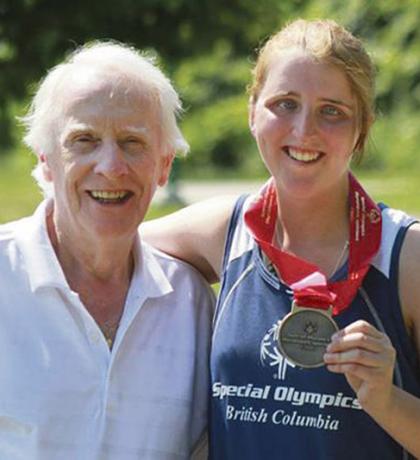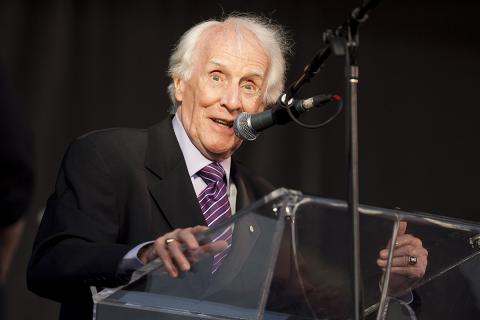
As we celebrate the 50th anniversary of Special Olympics this year, we are taking a look back at the #50moments that have defined the Special Olympics movement here in B.C. and throughout the world.
The incredible work of Dr. Frank Hayden has fundamentally changed the sport landscape in Canada and around the world.
Hayden is a pioneer of the Special Olympics movement, whose research was nothing short of groundbreaking. As a faculty member at the University of Toronto in the early 1960s, his study of children with intellectual disabilities revealed they were half as physically fit as their peers who did not have intellectual disabilities.
It was assumed that their low fitness levels were directly connected to their disabilities. Hayden’s body of work challenged that mindset – one that claimed it was the disability itself that prevented people from fully participating in play and recreation.
Through rigorous scientific study, Hayden proved that given the opportunity, people with intellectual disabilities could acquire the necessary skills to participate in sport and become physically fit.
In other words: Sport could have a transformative effect on the lives of people with intellectual disabilities.
Hayden’s initial research proved to be the springboard for Special Olympics. Inspired by his initial discoveries, Hayden began exploring how to develop a national sport program for people with intellectual disabilities.
In 1964, he presented his research at the first International Congress on the Psychology of Sport in Rome and published a testing and training manual, which was widely circulated across Canada and the United States. He was convinced that sport was the answer and designed and proposed a national program of sport training and competition in Canada.
As his research became more widely known, it caught the attention of the Kennedy Foundation in Washington, D.C. In 1965, Hayden moved to Washington to work alongside Eunice Kennedy Shriver, the founder of Special Olympics.
On July 20, 1968, he was integral to the first Special Olympics Games, held at Chicago’s Soldier Field. Just more than 1,000 athletes from 26 states and Canada competed at the inaugural Games. The first Special Olympics Games in Canada were held in 1969 in Toronto with 1,400 athletes from across the country. By the early 1970s – in just a few short years – Special Olympics had a presence in all 50 American states.
Hayden’s work also spread across Canada. In 1980, Special Olympics BC incorporated as a society, hosting competitions in Kamloops and Prince George.
In 1981, Hayden started Special Olympics International’s Office of International Development and served as its first director, establishing Special Olympics organizations and programs throughout the world.
He moved to Paris in 1988 to establish and direct the Office of European Affairs for Special Olympics International. Hayden was made an Honorary and Permanent Member of the Canadian Olympic Association in 1997, an Officer of the Order of Canada in 2000, and a Member of the Order of Ontario in 2010.
In 2016, Canada’s Sports Hall of Fame inducted Hayden. In his acceptance speech, Hayden said the inspiration for his work with people with intellectual disabilities was rooted in the role that sport plays in Canadian culture and the Canadian experience.
“My mission became to bring them into the Canadian sports family,” Hayden said. “I have to thank you, all of you, literally thousands of you, for accepting Special Olympics athletes, the coaches, the great volunteers we have, and their families into your sports family. You can’t imagine the marvellous things it does for their lives.”
A half-century after the first Games in Chicago, Special Olympics has made an immeasurable difference to the lives of people with intellectual disabilities in Canada and around the world.
Today, more than 4.9 million athletes from more than 170 countries participate in Special Olympics. The growth of the Special Olympics movement has had a broader societal impact – the realization that people with an intellectual disability have capabilities that extend beyond the field of play and into the workplace, schools, and communities.

